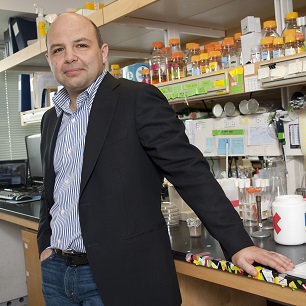Skip to content. | Skip to navigation
Personal tools

- Contact Us |
- Seminars |
- Donate

Lunenfeld-Tanenbaum
Research Institute
Mount Sinai Hospital
Joseph & Wolf Lebovic Health Complex
600 University Avenue
Toronto Ontario
M5G 1X5
Tel.: 416-586-4800 ext.2544
► Web of Science Researcher ID
A-7733-2010
Dr. Daniel Durocher
SENIOR INVESTIGATOR
Dr. Daniel Durocher investigates how cells detect and repair damage to their DNA. DNA damage can occur through environmental exposure to sunlight or smoking, but also occurs regularly through normal cellular processes associated cell division. DNA damage, in the form of DNA breaks, also play a beneficial role in the development of the immune system and of germ cells. Finally, DNA damage is harnessed therapeutically primarily for cancer therapy. Understanding how cells deal with DNA damage is therefore an important question in cell biology.
Understanding how healthy cells detect and repair damage to their DNA will also provide insights into what goes wrong in cells that become cancerous since it is known that cancer cells often have abnormal responses to DNA damage. Moreover, discoveries related to DNA damage will open the door to new, more sophisticated treatments for the disease: rendering cancer cells more vulnerable to chemotherapy for example, or developing drugs that can more selectively target cancerous cells.
In the past decade, Dr. Durocher and his team of researchers at the Lunenfeld-Tanenbaum discovered the function of proteins that are vital to the efficient repair of DNA damage. His team has elucidated how these proteins protect the integrity of DNA by detecting distinct marks at the site of DNA damage in the cell, and then helps direct repair of the damage, resulting in the re-joining of the broken DNA strands. When the DNA repair system is not functioning optimally in cells, mutations can go undetected and accumulate, potentially leading to abnormal growth and, eventually, tumours.
At a Glance
Investigates how cells detect and repair damage to DNA. This has implication for cancer therapy and aging.
Dr. Durocher is the Tom Kierans Research Chair in Mechanisms of Cancer Development.
Holds the Canada Research Chair in the Molecular Genetics of the DNA damage response
Awarded the prestigious 2016 Paul Marks Prize in Cancer Research from Memorial Sloan-Kettering in New York.
Major Research Activities
The major goal of Dr. Durocher´s lab is to understand how normal cells can become cancerous. Since genome instability is a hallmark of the cancer phenotype, his lab is studying DNA repair, DNA replication and cell cycle checkpoints, the gate keepers of the genome. Recently, Dr. Durocher has been taking advantage of CRISPR-based genome editing to make new insights into the mechanisms of DNA repair.



